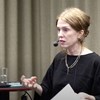federalt

Isabela Hazin
I have a bachelor’s degree in Biology from the Federal University of Pernambuco, Brazil, and a master’s degree in Human Evolution and Biology from the University of Coimbra, Portugal. At the Institute , led by and . This project is concerned with the question of how people's opinions on moral issues change over time. More specifically, if this change is mediated by arguments based on Moral Foundations – in a nutshell, whether moral positions (e.g., "against the death penalty") that are more strongly linked to harm and fairness arguments (e.g., "otherwise someone is hurt") spread more easily than those less strongly linked to such arguments. My main job is to help collect, clean, and analyze moral opinion data.
Is it possible to reduce the number of prisoners without increasing crime? Lessons from California
Venue: The Institute for Futures Studies, Holländargatan 13, Stockholm REGISTER > During Chesa Boudin's 2,5 years in office as San Francisco's elected district attorney, incarceration plummeted - the
NEW DATE! Avner de-Shalit: Cities and immigrants: Should cities have the power to decide who can settle in them?
Avner de-Shalit, Professor of Political Science and Max Kampelman Chair of democracy and human rights at the Hebrew University of Jerusalem.Abstract All over the world immigrants move to cities, rather

Kirsty Gover: Aboriginality and Alienage: Legal Pluralism at the Australian Border
Research seminar with Kirsty Gover, Professor at Melbourne Law School. Abstract The landmark Australian High Court case of Love-Thoms (2020) raised the possibility of constitutionalised Indigenous-sett
Kirsty Gover: Aboriginality and Alienage: Legal Pluralism at the Australian Border
Place: At the Institute for Futures Studies, Holländargatan 13, Stockholm, or online. Research seminar with Kirsty Gover, Professor at Melbourne Law School. REGISTER AbstractThe landmark Australian High C
Thomas Sommer-Houdeville: Remaking Iraq
- Neoliberalism and a System of violence after the US invasion, 2003-2011 Dr Thomas Sommer-Houdeville, Stockholm University, Department of Sociology. ABSTRACT After the invasion of Iraq and the destructi








